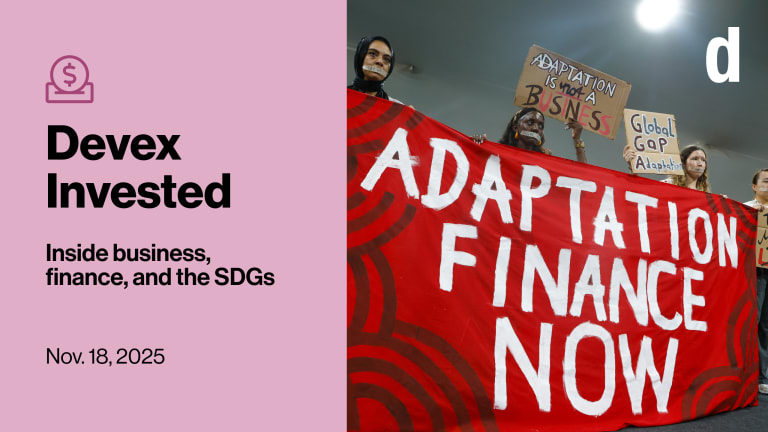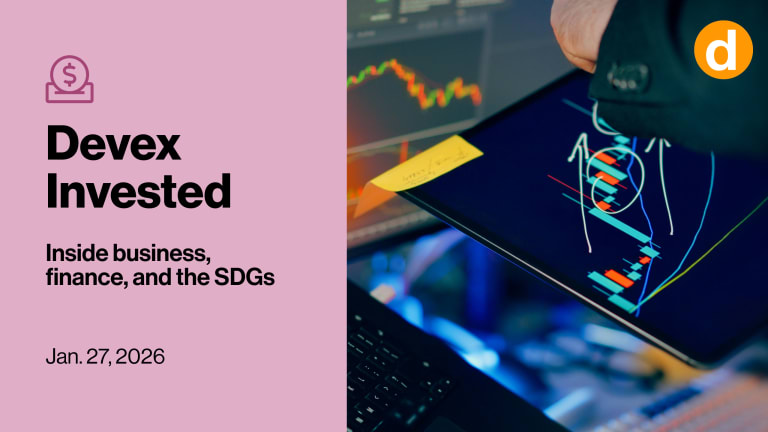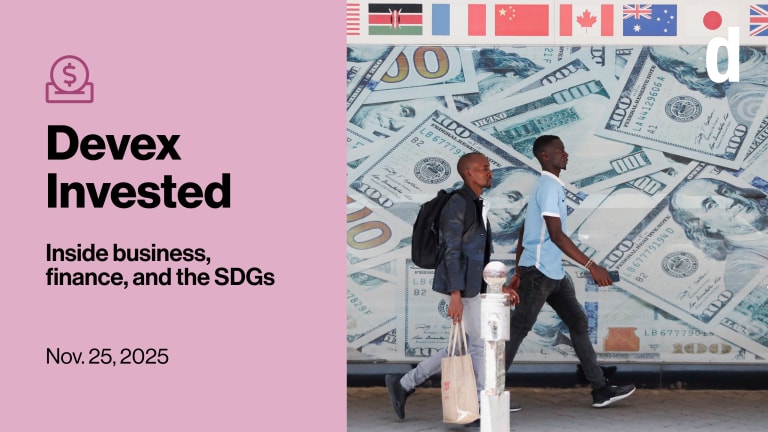
As 2,000-plus development finance professionals and experts gathered in Cape Town, South Africa, last week for the Finance in Common Summit, or FiCS, the dismantling of U.S. foreign aid halfway across the world in Washington, D.C., was top of mind.
Development finance as it has existed for decades — with a focus on official development assistance — is dead, many tell me. And not just because of the Trump administration’s actions but also the cuts to foreign aid across Europe, including in the United Kingdom last week.
This is a preview of Devex Invested
Sign up to this weekly newsletter to get the insider brief on business, finance, and the SDGs in your inbox every Tuesday.
The aid cuts “give a sense of urgency” to the summit and the broader Finance in Common Summit effort, Rémy Rioux, the CEO of the French Development Agency and chair of FiCS, tells me. The question at FiCS was what will emerge to replace it, and what role the world’s public development banks will play in that new reality. There are some 536 public development banks across 155 countries, which represent about 10% of total annual global investment, according to FiCS.
The goal of FiCS has been to organize those institutions, share knowledge, and work together to achieve climate and development objectives. At this summit, it was also clear that there was greater demand for collaboration and coordination with the larger ecosystem of public finance institutions, including multilateral development banks. That meant higher-level participation by MDBs at this summit — Inter-American Development Bank President Ilan Goldfajn spoke, as did World Bank Senior Managing Director Axel van Trotsenburg, and of course Jin Liqun, president of the Asian Infrastructure Investment Bank, which was one of the co-hosts. The Development Bank of Southern Africa was also a co-host.
Some of the key themes that emerged were local currency solutions; how to effectively mobilize private capital; how the public development banks can better work among themselves and with the broader development finance system; and how all these discussions will feature at the big Fourth International Conference on Financing for Development later this year.
In search of a new system
“The Finance in Common Summit is not just seizing a pivotal opportunity, but also inviting all stakeholders to be part of shaping the future of development finance and position Africa at the center of global financial discussions,” says Boitumelo Mosako, CEO of the Development Bank of Southern Africa.
There is a need to strengthen partnerships across institutions and come up with data-driven, pragmatic solutions to fund sectors including infrastructure, energy, water, transportation, health care, education, and affordable housing, she says.
Among public development banks, “this aspiration to be developmental is really what unites us, and when we think about sustainable development, it’s integrating climate and nature and health into sustainable economic growth,” Erik Berglof, AIIB’s chief economist, tells me. Where national development banks have local knowledge and access to local capital, they might lack capacity — which MDBs can bring — along with private capital.
AIIB plans to ramp up its funding to national development banks and work with local banking systems to assess development and climate projects and potentially incentivize entrepreneurs to come forward with projects, he says.
Public development banks can serve as a bridge. And in whatever alternative aid system that emerges, they can help create projects — and FiCs can be a global platform to coordinate, Rioux says.
This shift to more support for local institutions and more reliance on private sources of capital will make country development aims less susceptible to the decisions of voters far away. “You want the private sector to take over more and more and more, not just because the public resources are dwindling, but because this way you don't have to lose sleep over who's going to cut the budget,” Thomas Venon, the executive director at the Centre for Development Finance Studies, tells me.
So what does that mean? A shrinking pool of funds requires a hard look at what works when it comes to private capital mobilization, and how it's incentivized, measured, and rewarded, he says.
ICYMI: Amid decline in US aid, can private finance save the day?
+ Explore how countries could transform foreign aid cuts into local solutions in the area of health funding. Join our exclusive discussion with Olusoji Adeyi, president of Resilient Health Systems, tomorrow at 12 p.m. ET (6 p.m. CET) to discuss impacts and solutions. Save your spot now.
On their own two feet
Among African leaders, there was a recognition that governments and local financial institutions need to find alternatives and fuel their own economic growth moving forward.
It’s more important than ever to look at local investments and how to “intentionally capitalize” local commercial and development banks, says Samaila Zubairu, president and CEO of the Africa Finance Corporation, adding that what he’s always argued is that Africa needs investment, not aid. So even with dwindling resources, he thinks development assistance should be used to mobilize investment.
As for African public development banks, some got a bad rep in years past — but others, including younger institutions, have growing records of success.
Take the Development Bank of Nigeria, or DBN, founded in 2014 with backing from the World Bank, the African Development Bank, France, and Germany to the tune of $1.3 billion. Since then it has loaned about three times that amount in local currency, which is critical for small and medium businesses, especially as the value of the naira dropped in recent years. It has reached about 700,000 SMEs and has trained local financial institutions, including commercial banks, to help them support more, says Ijeoma Ozulumba, an executive director at the Development Bank of Nigeria.
“It's all well and good to have these funds coming in from abroad. But you also want to let the private sector in the local economy participate in this work,” Ozulumba says. DBN issued a bond in local currency two years ago that was oversubscribed with most of the investors being pension funds and asset managers, she says. BOAD, the West African Development Bank has also been able to tap capital markets, in part because it is a well-capitalized, well-governed, well-rated institution and as a result can pass along better rates to its clients, most of whom are subinvestment grade, says its president, Serge Ekué.
While DBN and BOAD, as well as some of the other larger PDBs on the continent, have been able to tap capital markets, many others cannot. And for these institutions to be a greater engine of economic development, they need to grow.
But unless credit rating agencies fundamentally change the way they rate Africa, countries and national development banks “will never be able to access capital markets,” says Aniket Shah, managing director and global head of the sustainability and transition strategy team at the Jefferies Group, an investment firm.
Shah’s proposal: Further expand the balance sheets of MDBs, and have them borrow more that could then be loaned to public development banks.
But John Asafu-Adjaye, a senior fellow at the African Center for Economic Transformation, warned that while these PDBs should get more lending, including through MDBs, they should invest more in small businesses and in smallholder farmers, who have the greatest needs and drive employment with the majority of the workforce in the informal sector, he says.
Related reading: $750M African climate-resilient infrastructure fund gets first investors
A seat at the table
This year, members of civil society and NGOs got the formal recognition in Finance in Common discussions and work that they’ve long sought, including in the official communiqué that has a commitment to launch a new coalition between public development banks and civil society.
The hope is that this coalition will address challenges and gaps between civil society and public development banks, says Zia ur Rehman, the national chair of the Pakistan Development Alliance. “I see the intervention of national development banks as a positive thing, we need to promote localization,” he says, but adds that they need to engage CSOs, follow through on social, economic, and environmental assessments and make investments that are truly developmental.
Clean slate
Your next job?
Senior Environmental and Social Development Specialist – CSO Engagement
Asian Infrastructure Investment Bank
China
Also last week in Cape Town, as the finance leaders of the Group of 20 largest and emerging countries met, a group of African former heads of state who comprise the African Leaders Debt Relief Initiative issued a call to action to address the growing debt crisis on the continent.
The Cape Town Declaration calls for comprehensive debt restructuring for highly indebted countries and efforts to lower the cost of capital for all low- and middle-income countries. The group is chaired by former Nigerian President Olusegun Obasanjo, and includes former presidents from Senegal, Malawi, Tanzania, Ghana, and Mauritius, and a former prime minister of Ethiopia.
The current G20 Common Framework for Debt Relief is too slow, too unclear up front about options for relief, and is a case-by-case program. What’s needed is a broader program that will address all highly indebted countries at once, similar to the 1990s Heavily Indebted Poor Countries Initiative.
“We are prepared to turn around our economies on our own … we understand there is no free lunch anymore,” says Joyce Banda, the former president of Malawi. “For that to happen we have to start with a clean slate, these debts have to be forgiven.”
Background: Risk aversion and credit ratings — why Africa is paying more for debt (Pro)
See also: Did the G20 move the needle on debt? (Pro)
+ Not yet a Devex Pro member? Start your 15-day free trial now to access the event as well as all our expert analyses, insider insights, funding data, and more. Check out all the exclusive content and events available to you.
What we’re reading
The World Bank pivoted to climate. That now may be a problem. [New York Times]
G20 finance ministers, central bankers meet amid fractious geopolitics. [Reuters]
Global health is at risk. Sustainable infrastructure can help. [Devex Opinion]








